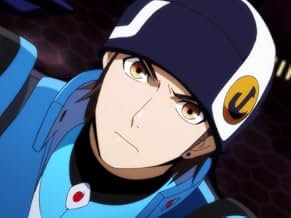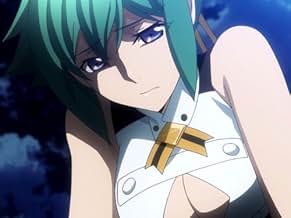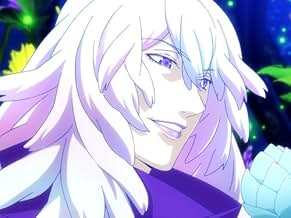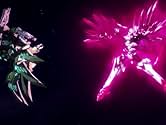Residents of planet Vega fight off invaders from Altair. Amata Sora, a young man with flight abilities, befriends Mikono Suzushiro. They join Neo-DEAVA and pilot Aquaria robots alongside oth... Read allResidents of planet Vega fight off invaders from Altair. Amata Sora, a young man with flight abilities, befriends Mikono Suzushiro. They join Neo-DEAVA and pilot Aquaria robots alongside other gifted Elements to counter Altairian attacks.Residents of planet Vega fight off invaders from Altair. Amata Sora, a young man with flight abilities, befriends Mikono Suzushiro. They join Neo-DEAVA and pilot Aquaria robots alongside other gifted Elements to counter Altairian attacks.
- Awards
- 2 wins total
Browse episodes
Storyline
Did you know
- ConnectionsFollowed by Aquarion Logos (2015)
Featured review
When it comes to anime concerning Mecha, there are a wealth of programs, including Eureka Seven, STR.A.IN, Patlabor and Gaiking, among many others. Although it isn't mandatory to have watched the original series, Genesis of Aquarion, I would personally recommend doing so in order to understand Aquarion Evol, a series that fuses the Mecha genre with a romantic storyline concerning family, friendship, loyalty and survival.
Set 12,000 years after the first series on the planet Vega, Amata, a young man with the uncanny ability to fly when he becomes emotionally unstable, happens upon Mikono, a young woman who is deeply unsure of herself. Amata's appreciation of the film, Skies of Aquarion, a story that resembles the original series, which Mikino also finds enjoyment in, is the first of many connections that draw their characters together. However, the enemy, who reside on the planet Altair, labeled abductors, who are similar in scope to the opposition in the first series and have been brutalizing the people of Vega, make an unappreciated entrance, forcing the Neo-DEAVA to deploy elements to their location.
Like in Genesis of Aquarion, the Mecha are a combination of three separate shuttles, piloted by young cadets with extraordinary abilities, that merge in order to fight against the enemy. Amata, similar to Apollo in the first series, immediately discovers he is gifted with elemental abilities of his own, and is capable of unlocking awesome power from Aquarion, he and Mikino joining the ranks of the many elements.
Though the fight scenes are entertaining, the fact the enemy continuously survive such harsh punishment can occasionally be unfathomable, and though it makes for good storytelling, the continuous return of opponents like Kagura, can sometimes become repetitive. The story concerning why the Alteans are attacking Vega certainly makes up for this addendum, and the way the creators are able to link the plots together is as similarly engrossing.
Unlike in Genesis of Aquarion where males and females unanimously merged, in Aquarion Evol, the very idea of two separate genders merging is considered abominable, for reasons explored over the duration of the series. Due to this decision, lustful desires play a major theme, heightening not only the tension and humor, but the romantic aspects of the feature with ideas concerning unrequited love.
At the academy, Amata meets Zessica, an awkward love triangle of sorts been instigated which plays out throughout the entirety of the series concerning which of the young women Amata will dedicate his life to. Although this situation, alongside the other romantic entanglements that transpire between other characters will inevitably generate laughs, the emotional tenderness used is as equally capable of generating a wealth of additional reactions.
Immediately, one of the first attractive features of the production is the animation: bright and beautiful, with colossal action sequences, rife with unimaginable destruction. Characters are impressively generated, not just physically, but emotionally as well, with outstanding levels of characterization, even secondary characters being gifted with the opportunity to shine in separate episodes. Though there are sexual references regarding the female form, accentuated often by the size of a woman's chest, this is tastefully achieved, without having to use explicit imagery, resulting often in humorous scenarios, similar to other anime.
The return of Fuduo from Genesis of Aquarion (if you're anything like me), will cause you to prance happily around the room, the wisdom he provided in the original franchise being just as brilliant here. Though there are many new characters, the features and characteristics they have can, on many an occasion, be contrasted directly with characters from Genesis of Aquarion (although I must admit I was a little bummed that Rena didn't make a return). The emotional poignancy created by the character's relationships, their back-story's and decisions, alongside the many tragedy's that plague the heroes is fabulously constructed, and sometimes it might be recommended that a box of tissues be kept on hand.
Furthermore, Yoko Kanno once more brings her talents to the soundtrack, which is as equally fabulous as that which accompanied Genesis of Aquarion, impacting the show by contemplating the story-lines. The opening theme on volume one of this series, Kimi No Shinwa - Aquarion Dai Ni Shou, performed by vocal goddess Akino and Bless4, is extraordinary, and beautifully displays the talents of this exceptional singer. Moreover, the concluding theme, Gekkou Symphonia, where Akino is accompanied by Aiki, clearly illustrates that all members of Bless4 truly are blessed with the capacity to unequivocally serenade an audience.
Where Genesis of Aquarion provided viewers with a collection of answers to the many plots that occurred, Aquarion Evol on many an occasion unties these, before reassembling them, causing not only the emergence of a richer, more diverse history, but a series of new questions that will keep the viewer rooted to the spot. There are many unpredictable occurrences that will surely entertain, and the way the creators are able to conclude the show is absolutely brilliant, and is a testament to what made the original series so great.
Set 12,000 years after the first series on the planet Vega, Amata, a young man with the uncanny ability to fly when he becomes emotionally unstable, happens upon Mikono, a young woman who is deeply unsure of herself. Amata's appreciation of the film, Skies of Aquarion, a story that resembles the original series, which Mikino also finds enjoyment in, is the first of many connections that draw their characters together. However, the enemy, who reside on the planet Altair, labeled abductors, who are similar in scope to the opposition in the first series and have been brutalizing the people of Vega, make an unappreciated entrance, forcing the Neo-DEAVA to deploy elements to their location.
Like in Genesis of Aquarion, the Mecha are a combination of three separate shuttles, piloted by young cadets with extraordinary abilities, that merge in order to fight against the enemy. Amata, similar to Apollo in the first series, immediately discovers he is gifted with elemental abilities of his own, and is capable of unlocking awesome power from Aquarion, he and Mikino joining the ranks of the many elements.
Though the fight scenes are entertaining, the fact the enemy continuously survive such harsh punishment can occasionally be unfathomable, and though it makes for good storytelling, the continuous return of opponents like Kagura, can sometimes become repetitive. The story concerning why the Alteans are attacking Vega certainly makes up for this addendum, and the way the creators are able to link the plots together is as similarly engrossing.
Unlike in Genesis of Aquarion where males and females unanimously merged, in Aquarion Evol, the very idea of two separate genders merging is considered abominable, for reasons explored over the duration of the series. Due to this decision, lustful desires play a major theme, heightening not only the tension and humor, but the romantic aspects of the feature with ideas concerning unrequited love.
At the academy, Amata meets Zessica, an awkward love triangle of sorts been instigated which plays out throughout the entirety of the series concerning which of the young women Amata will dedicate his life to. Although this situation, alongside the other romantic entanglements that transpire between other characters will inevitably generate laughs, the emotional tenderness used is as equally capable of generating a wealth of additional reactions.
Immediately, one of the first attractive features of the production is the animation: bright and beautiful, with colossal action sequences, rife with unimaginable destruction. Characters are impressively generated, not just physically, but emotionally as well, with outstanding levels of characterization, even secondary characters being gifted with the opportunity to shine in separate episodes. Though there are sexual references regarding the female form, accentuated often by the size of a woman's chest, this is tastefully achieved, without having to use explicit imagery, resulting often in humorous scenarios, similar to other anime.
The return of Fuduo from Genesis of Aquarion (if you're anything like me), will cause you to prance happily around the room, the wisdom he provided in the original franchise being just as brilliant here. Though there are many new characters, the features and characteristics they have can, on many an occasion, be contrasted directly with characters from Genesis of Aquarion (although I must admit I was a little bummed that Rena didn't make a return). The emotional poignancy created by the character's relationships, their back-story's and decisions, alongside the many tragedy's that plague the heroes is fabulously constructed, and sometimes it might be recommended that a box of tissues be kept on hand.
Furthermore, Yoko Kanno once more brings her talents to the soundtrack, which is as equally fabulous as that which accompanied Genesis of Aquarion, impacting the show by contemplating the story-lines. The opening theme on volume one of this series, Kimi No Shinwa - Aquarion Dai Ni Shou, performed by vocal goddess Akino and Bless4, is extraordinary, and beautifully displays the talents of this exceptional singer. Moreover, the concluding theme, Gekkou Symphonia, where Akino is accompanied by Aiki, clearly illustrates that all members of Bless4 truly are blessed with the capacity to unequivocally serenade an audience.
Where Genesis of Aquarion provided viewers with a collection of answers to the many plots that occurred, Aquarion Evol on many an occasion unties these, before reassembling them, causing not only the emergence of a richer, more diverse history, but a series of new questions that will keep the viewer rooted to the spot. There are many unpredictable occurrences that will surely entertain, and the way the creators are able to conclude the show is absolutely brilliant, and is a testament to what made the original series so great.
- totalovrdose
- Jan 28, 2015
- Permalink
Details
- Release date
- Country of origin
- Official site
- Languages
- Also known as
- 創聖機械天使EVOL
- Production companies
- See more company credits at IMDbPro
- Runtime25 minutes
- Color
- Sound mix
- Aspect ratio
- 1.78 : 1
- 2.35 : 1
Contribute to this page
Suggest an edit or add missing content























